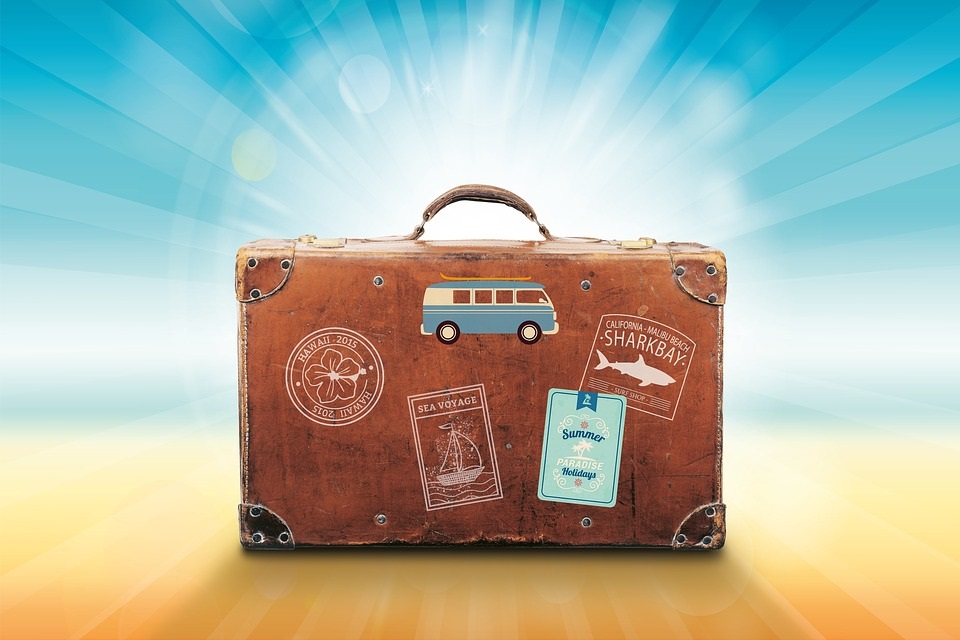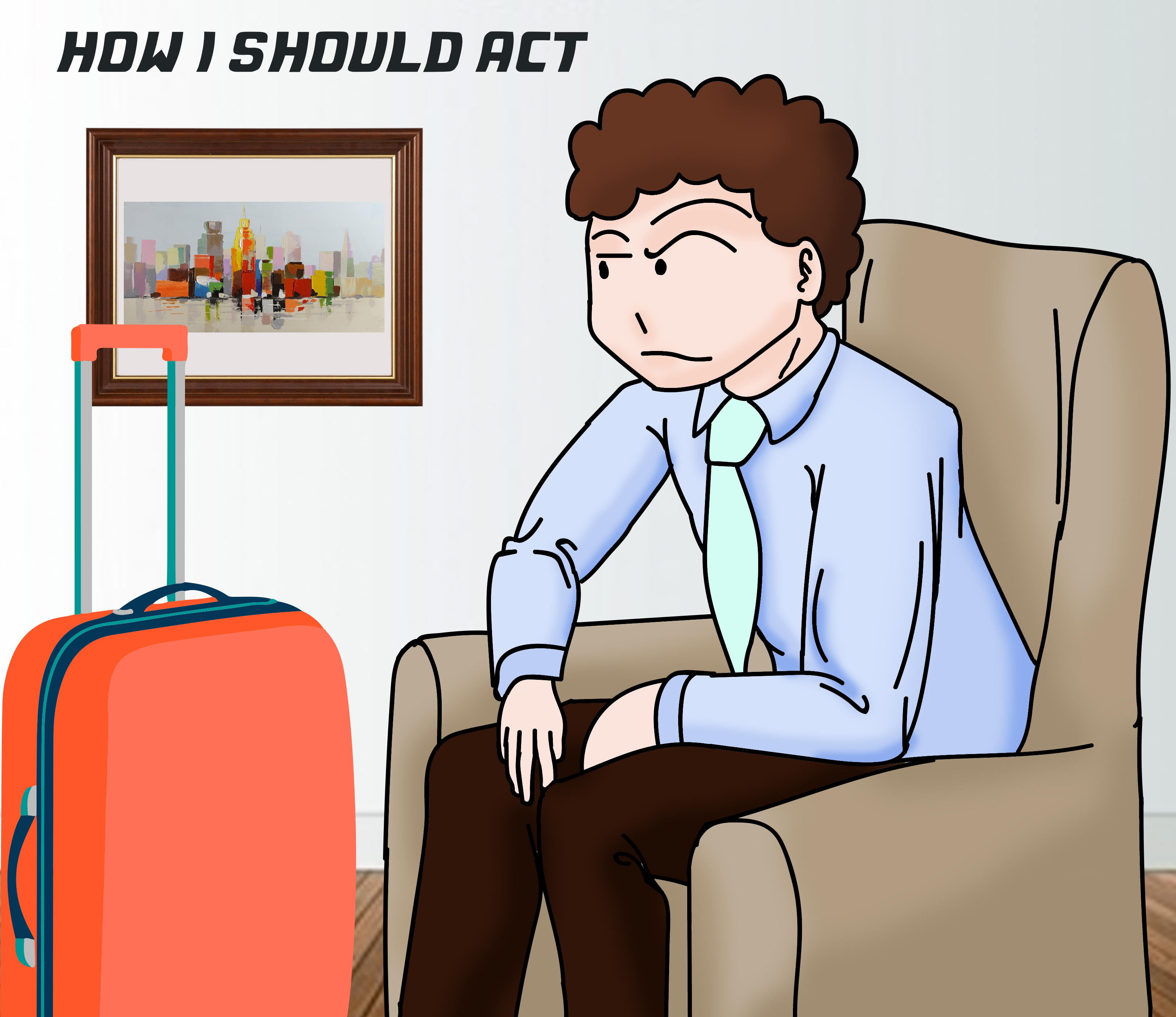
In this lesson, you will identify and use Should and Ought to, to give advice.
The simple present tense can be used to express different things. The first will be practised in the following sections.
We make suggestions when deciding where to go on holidays, what to do, what to eat, how much money to spend, etc., or giving people advice on what they might do in a specific situation when travelling. Imagine that a friend is visiting your country. Which suggestions would you make?
Here are some examples of giving suggestions in English:
In this lesson you will identify suggestions as well as the way to give pieces of advice using the four skills: Reading, Listening, Writing and Speaking.
By the end of this topic you will:
Identify correctly should and ought to to express suggestions and formally give advice through everyday situations.
What do you think about this photo? Is it true? How should you act when you are travelling? Should you hide your happiness?

Now, look at the following video about how to use these crucial modals:
Now that you have watched it do the following exercise.
As noticed, modals are essential. Read the sentences on the left. Match them with the right answer on the right. In the end, you will know your performance.

Activity 1
If travelling abroad, it is vital to know relevant information about the things you should know before travelling. Click on the image to read the text. This text gives people tips before travelling. Once you analyse it, select the ideas that are mentioned.
In the next activity click True (T) or False (F) on the sentences mentioned in the text. Once you have finished, click on CHECK to see the correct answers.
Activity 2
Have you travelled abroad? How do you feel after a long trip? Have you ever heard the word JET LAG? What does it mean? Read the following definition:
What’s JET LAG?

Now, look at the pictures below. They show some of the symptoms people suffer when they are jet lagged. Match them with their names.
Activity 3
When you are flying across time zones, it can take your body a bit of time to adjust. In the meantime, you are graced with unpleasant ailments like fatigue, insomnia, constipation, diarrhoea, confusion, and more—enough to send you frantically searching for a jet lag cure. Fortunately, there are some practical things you can do to prevent jet lag or to aid your recovery from jet lag. Listen to a person talking about the things people should do to avoid Jet Lag. Then put the sentences below into the correct column. Be careful; there are ideas that are not mentioned in the audio.
Click here to hear audio.
Activity 4
Are you a saver or spender?
To find the answer to this question do the following quiz.
| Mostly As You like to spend, spend, spend and don’t care who knows it or whose money you’re using. Spending a wad of cash can be a great feeling but once the buzz has gone, you’re left penniless. You should hold back a bit with your finances so that you don’t miss out on some of the spending opportunities that might come your way. |
Mostly Bs It sounds like you’ve got the balance right between spending and saving. You’re responsible for your own outgoings and pretty much in control of your finances, you should ask when you need a little help. |
Mostly Cs You’re quite the penny pincher! If there’s a bargain to be had or a saving to be made, you’re on it straight away. You should save money and you shouldn’t spend the lot in ten minutes |
Activity 5
When we travel, we would like to try all the tourist attractions, fancy restaurants and five-star hotels. Spending money on transport and tips should not be a problem. The ugly truth is that we are not rich.
Read the text "How to save money when travelling". Then make a list of the ways tourists can save money when visiting your country. You will need this information before writing your text.
Now, you want to contribute to a blog that wants to give tourists advice on saving money when visiting your country.
Write a short paragraph (80-100 words) in which you suggest how tourists can save money when they visit your country. Mention information about:
• Transport
• Food
• Accommodation
• Extras (souvenirs, attractions, cell phone, etc.)
Include should and ought to to make suggestions.
Write the paragraph in the space provided, follow this example:
When you travel, you should book in advance to save some money. It is recommended that you should look for a cheaper option to eat, including food stalls and small restaurants. Also buying travelling local transportation tickets is a must. Train tickets are cheaper when you purchase them in advance, so you ought to do it if you want to save money. You should also try to do the same with events or museum tickets. In this global economy saving money is what everyone should do.
Remember to check the rubrics for better performance.
Example:

Activity 6
A friend of yours, who is from the USA is visiting your country and has sent you a voice message. He lost his/her passport and does not know what to do. Read the text "What should I do if I lose my passport?" Based on that information, send him a voice message back. Your message must include:
Record your speech and pay close attention to the characteristics contained in the rubrics. Verify you use modals to express advice.
Choose the correct answer.
Choose the correct option.
• Brooks, D. (2015, abril). 20 Tips Before Traveling Internationally. Travelzoo. Recuperado 03 de septiembre de 2016. http://www.travelzoo.com/blog/20-tips-before-traveling-internationally/
• Fodor'sTravel. (2014, febrero). Top 10 tips for avoiding Jet Lag. Recuperado el 05 de septiembre de 2016 de http://www.fodors.com/news/10-tips-to-avoid-jet-lag-4457
• Merriam-Webster Learner's Dictionary online. Recuperado el 05 de septiembre de 2016 en http://www.merriam-webster.com/dictionary/jet%20lag
• Need2knowcouk. (2014, septiembre). Are you spender or a saver? Recuperado el 04 de septiembre de 2016 de http://www.need2know.co.uk/money/savings/article867/
• Rexroat, K. (2015, agosto). What to do if you lose your passport. Travelzoo Recuperado el 05 de septiembre de 2016 de http://www.travelzoo.com/blog/lose-passport/
• WikiHow (2016). Recuperado el 03 de septiembre de 2016 de http://www.wikihow.com/Save-Money-When-Travelling